Bisleri
Bisleri Launches Ad Campaign In Mumbai For New Masala Soda
 Indian bottled water company Bisleri is promoting the brand Spyci, its take on the once-popular street drink masala soda. The campaign was launched in Mumbai's out-of-home (OOH) space, comprising mainly roadside billboards and pop art style posters. Created by Ogilvy ad agency 82.5 Communications, the campaign focuses on the uniqueness of the soft drink – sort of a spicy lemonade – that appeals to the Indian palette. The target demographic is the age group 16-32, so the billboards were strategically placed in the parts of Mumbai that offer the highest visibility with this group. The campaign will soon expand beyond billboards to digital and TV ads.[Image Credit: © Bisleri International Pvt. Ltd]
Indian bottled water company Bisleri is promoting the brand Spyci, its take on the once-popular street drink masala soda. The campaign was launched in Mumbai's out-of-home (OOH) space, comprising mainly roadside billboards and pop art style posters. Created by Ogilvy ad agency 82.5 Communications, the campaign focuses on the uniqueness of the soft drink – sort of a spicy lemonade – that appeals to the Indian palette. The target demographic is the age group 16-32, so the billboards were strategically placed in the parts of Mumbai that offer the highest visibility with this group. The campaign will soon expand beyond billboards to digital and TV ads.[Image Credit: © Bisleri International Pvt. Ltd]
Coca-Cola
State-Of-The-Art $86M Atlanta Coca-Cola Sales Center Opens
 Atlanta Coca-Cola Bottling Company United has officially opened a new $86 million high-tech sales center in Union City. One of the largest investments in a sales center in Coca-Cola’s U.S. operations, the 456,000 square foot facility with state-of-the-art technology includes a sales and distribution center, warehouse, fleet shop, administrative offices, and meeting space. The South Metro Sales Center with its 750 employees will serve more than 10,000 customers throughout Atlanta who refresh some 2.8 million consumers annually with beverages from the Coca-Cola portfolio. It uses a "Vertique" warehousing system that turns the case picking process into an organized, more ergonomic, and efficient sequential operation that is less labor intensive. [Image Credit: © PRNewsfoto/Coca-Cola Bottling Company UNIT]
Atlanta Coca-Cola Bottling Company United has officially opened a new $86 million high-tech sales center in Union City. One of the largest investments in a sales center in Coca-Cola’s U.S. operations, the 456,000 square foot facility with state-of-the-art technology includes a sales and distribution center, warehouse, fleet shop, administrative offices, and meeting space. The South Metro Sales Center with its 750 employees will serve more than 10,000 customers throughout Atlanta who refresh some 2.8 million consumers annually with beverages from the Coca-Cola portfolio. It uses a "Vertique" warehousing system that turns the case picking process into an organized, more ergonomic, and efficient sequential operation that is less labor intensive. [Image Credit: © PRNewsfoto/Coca-Cola Bottling Company UNIT]
Analysis Of Vending Machine Data Leads To Introduction Of Cherry Vanilla Coke
Coke Sweden Unveils New Plastic1 Bottles With White Labels Touting Recycling
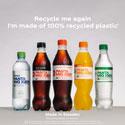 Coca-Cola Sweden is about to debut a new range of plastic bottles made from recycled plastic1 with white labels that more clearly communicate the message “Recycle me again.” The new labels will be introduced across the Coca-Cola, Fanta, Sprite, and Bonaqua brands and are part of a broad sustainability initiative to create a circular economy for its plastic packaging. According to the company, the transition to 100 percent recycled plastic1 in Sweden affects 205 million bottles a year. Coke Sweden is encouraging customers to return the used bottles to be recycled again, “so that no material is ending up as litter or waste.” The company has an effective deposit system in Sweden: 85 percent of all PET bottles are deposited and recycled. The goal is to reach 100 percent recycling by 2025. [Image Credit: © WebWire/The Coca-Cola Company]
Coca-Cola Sweden is about to debut a new range of plastic bottles made from recycled plastic1 with white labels that more clearly communicate the message “Recycle me again.” The new labels will be introduced across the Coca-Cola, Fanta, Sprite, and Bonaqua brands and are part of a broad sustainability initiative to create a circular economy for its plastic packaging. According to the company, the transition to 100 percent recycled plastic1 in Sweden affects 205 million bottles a year. Coke Sweden is encouraging customers to return the used bottles to be recycled again, “so that no material is ending up as litter or waste.” The company has an effective deposit system in Sweden: 85 percent of all PET bottles are deposited and recycled. The goal is to reach 100 percent recycling by 2025. [Image Credit: © WebWire/The Coca-Cola Company]
Coca-Cola’s Smaller Packaging Acknowledges Japan’s Demographic Trends
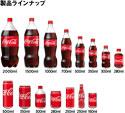 Coca-Cola Japan has launched two new PET packaging sizes, 350ml and 700 ml, for Coca-Cola soft drinks tol be sold in supermarkets, drug stores, and discount stores in the Tokyo, Kanagawa, Chiba, and Saitama prefectures. The existing core packaging sizes for Coca-Cola are 500 ml PET and 1.5 l PET. Besides PET, there are also a variety of glass (190 ml), aluminum bottle (280 ml), and can (350 ml, 500 ml) packages. The company said the two newly launched sizes were meant to meet changing consumer trends – specifically, shrinking birth rates and an aging population that contribute to smaller families (two or three people per household). It is now increasingly common for small groups of people to share small-sized beverages. The company said consumers have also shifted to drinking sparkling beverages at home and the two new package sizes are optimal for this trend.[Image Credit: © Coca-Cola (Japan) Company, Limited]
Coca-Cola Japan has launched two new PET packaging sizes, 350ml and 700 ml, for Coca-Cola soft drinks tol be sold in supermarkets, drug stores, and discount stores in the Tokyo, Kanagawa, Chiba, and Saitama prefectures. The existing core packaging sizes for Coca-Cola are 500 ml PET and 1.5 l PET. Besides PET, there are also a variety of glass (190 ml), aluminum bottle (280 ml), and can (350 ml, 500 ml) packages. The company said the two newly launched sizes were meant to meet changing consumer trends – specifically, shrinking birth rates and an aging population that contribute to smaller families (two or three people per household). It is now increasingly common for small groups of people to share small-sized beverages. The company said consumers have also shifted to drinking sparkling beverages at home and the two new package sizes are optimal for this trend.[Image Credit: © Coca-Cola (Japan) Company, Limited]
Nestle
Nestlé’s Henniez Mineral Water Brand Says All Bottles Made With 75 Percent rPET
 Nestlé Waters mineral water brand Henniez announced that all of its plastic bottles are now made of 75 percent recycled PET plastic (rPET). The Swiss brand has been using 30 percent recycled PET since 2013 and hopes to eventually reach 100 percent locally recycled PET. Discarded PET bottles will be made into new Henniez recycled plastic bottles multiple times, without tapping into new oil resources. Three weeks ago, Nestlé committed to invest up to $2 billion to drive the shift from virgin plastics to food-grade recycled plastics. It also committed to speed up development of innovative sustainable packaging solutions. The Henniez mineral water brand celebrates its 115th anniversary this year. [Image Credit: © 2020 Nestlé]
Nestlé Waters mineral water brand Henniez announced that all of its plastic bottles are now made of 75 percent recycled PET plastic (rPET). The Swiss brand has been using 30 percent recycled PET since 2013 and hopes to eventually reach 100 percent locally recycled PET. Discarded PET bottles will be made into new Henniez recycled plastic bottles multiple times, without tapping into new oil resources. Three weeks ago, Nestlé committed to invest up to $2 billion to drive the shift from virgin plastics to food-grade recycled plastics. It also committed to speed up development of innovative sustainable packaging solutions. The Henniez mineral water brand celebrates its 115th anniversary this year. [Image Credit: © 2020 Nestlé]
Other Companies
Roar Organic Targets Active Millennial Females With New “Electrolyte Infusions” Drink
Blue Foods And Drinks – Suggesting High Anthocyanin Content – Are All The Rage
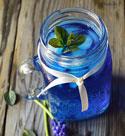 Swiss fragrance and flavor company Firmenich has named comfort-inducing “classic blueberry” as its flavor of the year for 2020. Color expert Pantone LLC says “classic blue” – a “timeless and enduring hue” – suggests to consumers a high anthocyanin content in foods and beverages. Anthocyanin compounds are flavonoids that function as antioxidants and are abundant in blue, purple, and red fruits. Consumers associate anthocyanins and the color blue with health and wellness, as long as the colors are naturally produced. That presents a challenge for food and beverage companies, but several say they they’ve got what consumers want. Archer Daniels Midland Co., for example, has developed a stable blue food coloring from the juice of the Peruvian huito plant. Other sources of natural blue colors include: blue-green algae; butterfly pea flower extract; and the gardenia blue plant. The real value of natural blue colors is their ability to blend with other natural colors to produce a wider range of brown shades, yellows, oranges and reds. [Image Credit: © Pavlina8 from Pixabay.com]
Swiss fragrance and flavor company Firmenich has named comfort-inducing “classic blueberry” as its flavor of the year for 2020. Color expert Pantone LLC says “classic blue” – a “timeless and enduring hue” – suggests to consumers a high anthocyanin content in foods and beverages. Anthocyanin compounds are flavonoids that function as antioxidants and are abundant in blue, purple, and red fruits. Consumers associate anthocyanins and the color blue with health and wellness, as long as the colors are naturally produced. That presents a challenge for food and beverage companies, but several say they they’ve got what consumers want. Archer Daniels Midland Co., for example, has developed a stable blue food coloring from the juice of the Peruvian huito plant. Other sources of natural blue colors include: blue-green algae; butterfly pea flower extract; and the gardenia blue plant. The real value of natural blue colors is their ability to blend with other natural colors to produce a wider range of brown shades, yellows, oranges and reds. [Image Credit: © Pavlina8 from Pixabay.com]
Ginger Beer Maker Reed’s Debuts Functional Ginger Shots Line
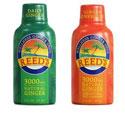
U.S. ginger beer brand Reed’s (Norwalk, Ct.) has launched a line of functional shots made with fresh ginger in two variants: ginger energize, featuring caffeine from green coffee beans and guarana, and daily ginger, a caffeine-free alternative. Each shelf-stable two-oz. shot has three grams of organic pressed ginger boasting anti-inflammatory and antioxidant properties. Reed’s Wellness Ginger Shots retail for $2.99 a bottle and $35 per 12-pack. Sold in 35,000 stores across the U.S., the Reed’s ginger beer line is available in original, extra, and strongest flavors.[Image Credit: © GlobeNewswire, Inc/Reeds Inc.]
Coffee Company Ronnoco Expands In Foodservice Sector With Acquisition
 Ronnoco Beverage Solutions, a St. Louis-based coffee roaster and beverage distributor, has acquired a Houston firm that provides beverage dispensers to the foodservice industry and other businesses in the U.S. Founded in 2004, Trident Beverage supplies bars, restaurants, and schools with beverage dispensers, including juice dispensers, tea dispensers and bag-in-box beverage dispensers. Ronnoco says the acquisition of Trident will expand the company’s service area footprint with new channels, supplementing current product categories and geographic distribution. Previously known as Ronnoco Coffee, the company rebranded as Ronnoco Beverage Solutions following its purchase of U.S.-based equipment supplier Beverage Solutions Group in March 2018.[Image Credit: © Trident Beverage]
Ronnoco Beverage Solutions, a St. Louis-based coffee roaster and beverage distributor, has acquired a Houston firm that provides beverage dispensers to the foodservice industry and other businesses in the U.S. Founded in 2004, Trident Beverage supplies bars, restaurants, and schools with beverage dispensers, including juice dispensers, tea dispensers and bag-in-box beverage dispensers. Ronnoco says the acquisition of Trident will expand the company’s service area footprint with new channels, supplementing current product categories and geographic distribution. Previously known as Ronnoco Coffee, the company rebranded as Ronnoco Beverage Solutions following its purchase of U.S.-based equipment supplier Beverage Solutions Group in March 2018.[Image Credit: © Trident Beverage]
Ascent Introduces Line of Protein Waters For Post-Workout Recovery
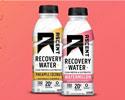 Family-owned sports nutrition company Ascent (Denver Colo.), a subsidiary of whey and cheese producer Leprino foods, has launched a water-based beverage range that combines protein and electrolytes for post-workout recovery. Recovery Water, made using the company’s proprietary native whey protein formulation process, contains 20 g of native whey protein and 2.5 grams of naturally occurring leucine to trigger muscle protein synthesis. Both flavors – watermelon and pineapple coconut – contain 100 calories. The products are gluten-free, soy free, rBST/rBGH free and are Informed Choice Certified, meaning Ascent is third-party tested for banned substances.[Image Credit: © Ascent Protein]
Family-owned sports nutrition company Ascent (Denver Colo.), a subsidiary of whey and cheese producer Leprino foods, has launched a water-based beverage range that combines protein and electrolytes for post-workout recovery. Recovery Water, made using the company’s proprietary native whey protein formulation process, contains 20 g of native whey protein and 2.5 grams of naturally occurring leucine to trigger muscle protein synthesis. Both flavors – watermelon and pineapple coconut – contain 100 calories. The products are gluten-free, soy free, rBST/rBGH free and are Informed Choice Certified, meaning Ascent is third-party tested for banned substances.[Image Credit: © Ascent Protein]
Copyright 2026 Business360, Inc.

